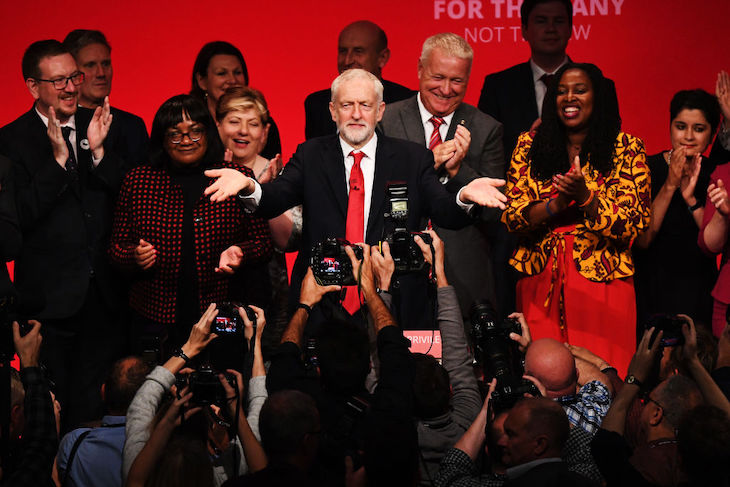On the face of it, the Labour party conference commitment to bring forward Britain’s net zero greenhouse gas emission target to 2030 is nothing short of reckless. ‘We need zero emissions,’ the economist Paul Johnson and member of the Committee on Climate Change tweeted. ‘Getting there by 2050 is tough and expensive but feasible and consistent with avoiding most damaging climate change. Aiming for zero emissions by 2030 is almost certainly impossible, hugely disruptive and risks undermining consensus.’ The GMB, the union representing what remains of Britain’s industrial workers, warned that it could lead to widespread job losses. The GMB is right. Accelerated decarbonisation is a formula for rapid de-industrialisation.
As politics though, it’s a masterstroke. There is plenty of wiggle room in the policy, which only commits Labour to ‘work towards a path’ to net zero. At the same time, Labour is ensnaring the Conservatives in a trap of their own making. If you like 2050 net zero, you’re going to love Labour’s 2030 a lot more.
The Conservatives dug this hole for themselves with their rank indifference to the cost and practicality of aggressive climate policies. The Committee on Climate Change had already warned the government that its target to reduce CO2 emissions by 80 per cent was going to be missed. ‘Current policy,’ it declared, ‘is insufficient for even the existing targets.’ The committee complained that ten years after the 2008 Climate Change Act, there was still no plan to decarbonise heating and no large-scale trials have begun for heat pumps or hydrogen which, so the thinking goes, will replace cheap and reliable natural gas.
Although the impact of net zero makes the consequences of any form of Brexit puny by comparison, it was only subject to a 90-minute House of Commons debate. ‘We should be honest that it is a huge industrial undertaking, and it will have significant cost,’ Dieter Helm, professor of energy and economics at Oxford, warned when the plan was announced. ‘These are enormous industrial activities, there is nothing in history that looks like this outside of wartime.’
Accuracy about costs has been in short supply from ministers. During the debate, the Labour MP Graham Stringer asked minister Chris Skidmore why the government had not provided an impact assessment for the statutory instrument that turns the net zero target into law. Replying, Skidmore told Parliament: ‘We did not have an impact assessment when we moved from 60 per cent to 80 per cent’.
That now looks to have been a statement of distinctly questionable accuracy given that Ed Miliband, energy and climate minister at the time, signed a regulatory impact assessment for the 80 per cent target in March 2009. It estimated recurring costs of £14.7bn to £18.3bn a year and a total cost of £324 to £404bn, a low-ball range that excluded short and medium-term transitional costs. Importantly, Ed Miliband’s impact assessment warned that were the UK to act alone, we ‘would bear all the cost of the action and would not experience any benefit from reciprocal reductions.’ That warning has gone unheeded. According to the IEA, between 2008 and 2016 the UK cut its carbon dioxide emissions from fuel combustion by 136.8 million tonnes, a reduction of 26.9 per cent. At the same time, the rest of the world increased its emissions by 3,111 million tonnes, an increase of 11.3 per cent. The government’s preferred stance is to remain in denial about what the rest of the world is or isn’t doing.
Labour’s move has the one benefit of giving the government a political incentive to be more honest about costs. As part of the deal to get Philip Hammond’s sign off when he was Chancellor, the Treasury is to lead a review into the costs of decarbonisation. The Treasury had better get a move on.
Rupert Darwall is author of Green Tyranny.






Comments